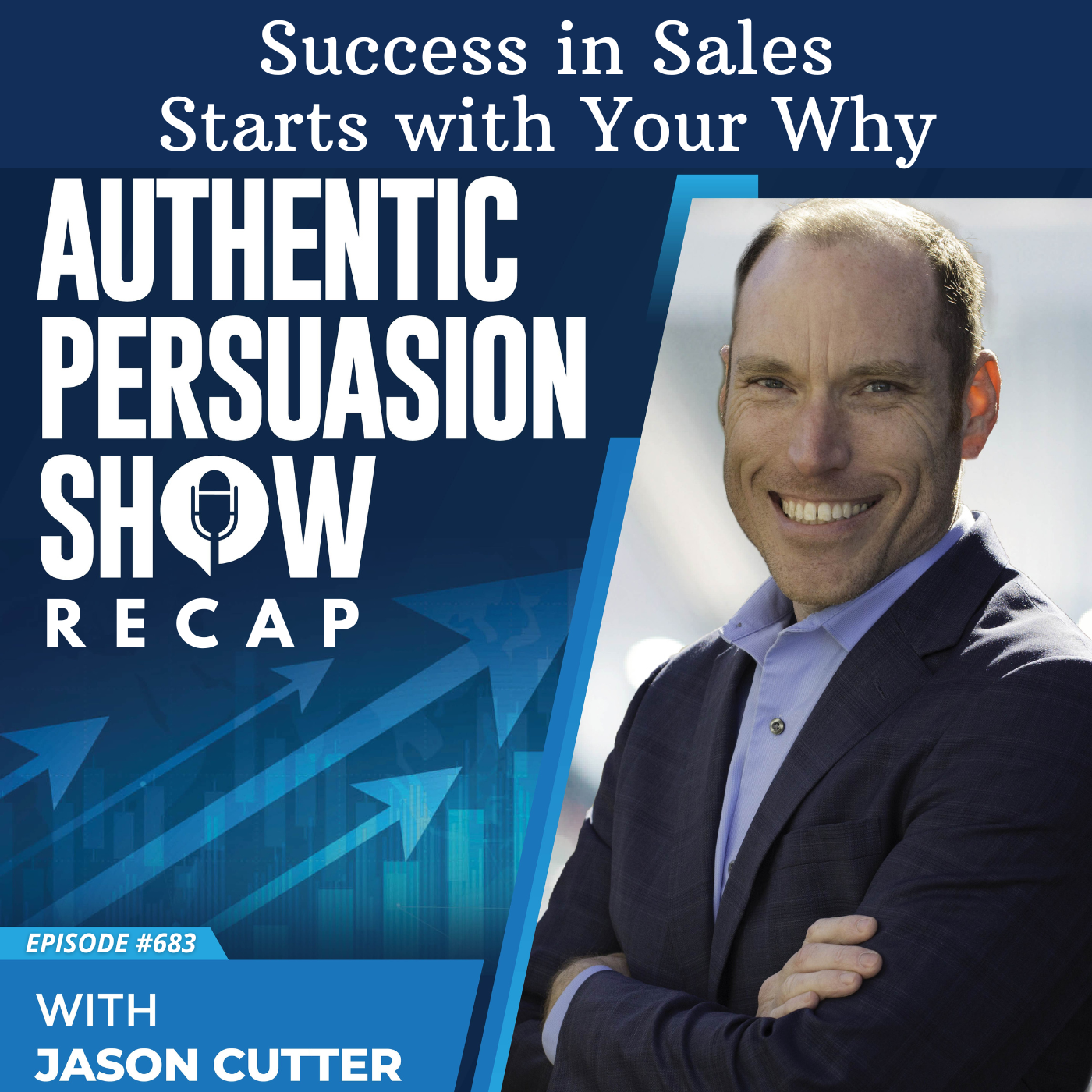Episode Transcript
[00:00:00] Speaker A: Welcome to the authentic Persuasion show. On this episode, I want to replay part of a previous show. Maybe you heard the original full length episode and this could be a great refresher and reminder, or maybe this is your first time hearing this content and the timing could be just right to help you leverage authentic persuasion today in your role, no matter what. Here's to your success.
This is the authentic persuasion show.
[00:00:26] Speaker B: A lot of people, by the time I talk to them or I'm doing training or I'm advising them or their companies is they say, yes, that's happening. Like, you know, I'm reaching out to these people and no one is calling me back. The first thing is understanding that it might be too late. The things that led to you ending up with a pipeline that's in this, you know, follow up trap where people aren't responding. The thing is, is that it might be too late. And I know people don't want to hear that. And it's tough because the results of having people who aren't calling you back is related to what's done in those sales conversations. And if you're not following the authentic persuasion pathway and the rapport and the empathy and the trust and the hope and the next step that I'm going to talk about next week, that fifth and final step, which is the most important one for all of this, if you're not doing that in these conversations and you're in the classic sales mode, which is, I'm the hero, I'm amazing, you should want what I have. I'm going to push you towards that. That is not going to work. And once those people get off the phone and they get away from you, it's kind of like somebody who's hypnotized or under a spell getting away from that person who cast a spell on them and like, it's wearing off and they realize, wait a second, I don't want that or I don't want to do that. And that's what's happening, right. That's why a lot of people, they, they use a very gross urgency in sales because they know that if that person steps away, theyre going to lose that opportunity. But thats not what I want for you all. What I want you to use is authentic persuasion and be able to sell and persuade like a professional such that people want what youre offering. And you know that you have the right solution. If youre not doing that, the challenge is that a lot of times that pipeline of people that youre following up, youre trying to get back on board. Youre trying to move them forward. The challenge is the damage is already done. The trust step wasn't done correctly. They don't feel safe. They have retreated back into their comfort zone and locked up even tighter. And what I'll tell you, and this is my feeling based on listening to calls, talking to people, and just seeing it so many times, I feel like many times, and I know this, I'll say myself as a consumer, is there's times where I almost buy something or I think about buying something and I talk to a salesperson and then I get away from it. The ability to say no, like, I use it in that moment. I don't always, but when I say no, then I step away and then I'm like, oh, my gosh, I'm so glad that I didn't buy that. Right. I'm relieved. I count my blessings and I go, okay, that is amazing. I dodged a bullet by not signing up for that service or buying that thing or doing that thing. And I'm so grateful for that. And that's what can happen a lot of times when it's not done properly. Not only are they going to retreat to the safety of their comfort zone, they're going to be grateful and thankful they didn't sign up, which when you call them, is just going to aggravate them even more. Or it will also make them, make them a more difficult customer buyer in the future because they might be even less trusting of other salespeople down the road. And I know that we've all experienced that. If you've been in sales for any length of time where it almost feels like you're inheriting somebody else's bad deeds and you're basically getting the distrust that that prospective person has in general for salespeople because of being burned in the past. And we've all had that. Where somebody comes at you with lots of questions, lots of issues, lots of challenges, want to know about price contracts? Oh, I never signed contracts. I never pay more than this. I would never sign up for that because of what has happened to them in the past. And that's always super important. And I don't think I have done very much in these sessions talking about overcoming objections. When I get to that part, I will explain why this happens and then also what to do about it. And if you're having challenges with overcoming objections now or you want to get better at it or take a completely different approach than you might already be doing, make sure hit me up because I'm happy to send you my ebook. So email me jasonutterconsultinggroup.com dot I have an ebook, which is a sales consultant's guide to overcoming objections. Um, that's like the number one thing that people usually have challenges with in the moment in their selling process. Like the first thing they think they have an issue with. And then usually what happens is we find out there's more and we work on more of these strategies. Um, but email me, and I'm happy to send you the PDF version of that ebook. Or you can find it on Amazon, uh, on Kindle, but I'm happy to send it to you to help you. Here's the thing, though, is that you've got this person that you're dealing with. You haven't closed them. You let them off the phone, or you're done with your meeting, they're not answering. You can't get them back into your process, your pipeline, what can you do about it? Again, for most people out there, the damage is done. You can't recover that. It's not possible. What was done damaged it or caused it. To get to a point where they put their head back in the sand, they're in their comfort zone. They feel safe, they feel secure. They might be grateful they didn't buy from you, and they avoided a bullet. Uh, and it's done. In those situations, sometimes what you can do as a company is shuffle pipelines. Have a different person call those people back. Uh, and maybe that will revitalize them. Maybe a different voice will help them feel better. Right? Like they don't like John. So let me get them to Kim. They didn't like Becky. Let me get them to bill. Switch some pipelines. Maybe a new voice, maybe a different person. You never know. Sometimes that will revive some of those people. So that's the bad news. That's the downside with this, is that if you're stuck in the follow up trap, which is your people are not calling you back, sometimes there's very little you can do. Now, you could do some, uh, marketing things and some retargeting and some finding them online. But again, if they put their head back into the sand, that's a tough one. So that's the bad news people usually don't want to hear about. Let's talk about what you can do. The key is moving forward using the authentic persuasion pathway and using this process to avoid the follow up trap. The biggest thing we want to do is avoid the follow up trap. Now, why aren't people responding? One of the biggest things and reasons why people aren't responding is because they don't think you care and they don't think you're trying to help them. And I've talked about this many times in these training sessions. I talk about it when conferences and companies have me come on stage or speak to their groups and I'm doing trainings is one of the biggest things is that you following this process we've been talking about such that the people you're talking to, your prospective customers, these clients, these people you want to be moving forward in your pipeline, is you make it about them. That's why I have built this model like I have the authentic persuasion pathway with the rapport, the empathy, the trust and the hope. And then this fifth step coming up soon is that it's all about them. And so you want to make sure you follow that process.
And if you do that, that changes why they're not following up, why they're not responding. Okay, so that's one of the biggest things.
![[748] Transforming Your Sales Process](https://episodes.castos.com/salesexperiencepodcast/images/1720326/c1a-4d8w-jk0d80xdhorx-0cfrh0.png)


